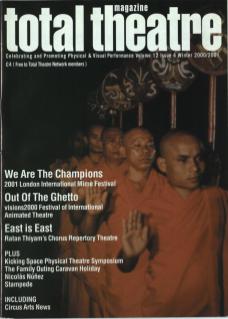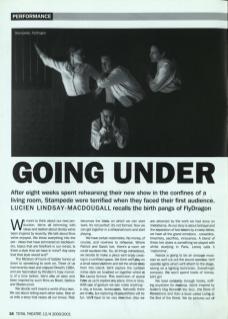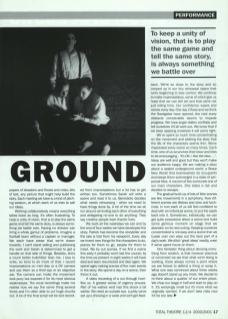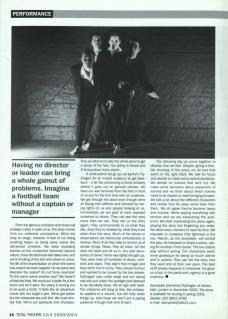We meet to think about our next production. We're all brimming with ideas and blather about stories we've been inspired by recently. We talk about films we’ve enjoyed. We throw everything into the pot – ideas that have simmered on back-burners, topics that are forefront in our minds. Is there a style that we have in mind? Any story that that style would suit?
The filtration of hours of babble hones us down to something to work on. Three of us had recently read and enjoyed Orwell's 1984, and are fascinated by Winston's hazy memory of a time before. We'd also all seen and been inspired by such films as Brazil, Gattica and Bladerunner.
We decide we'll invent a world of our own. We set about telling each other tales. One of us tells a story that raises all our brows. That becomes the basis on which we can start work. It's not perfect. It's not formed. Now we can get together in a rehearsal room and start playing.
We have certain restrictions. No money, of course, and nowhere to rehearse. Where Patrick and Sarah live, there's a room we could squeeze into. So, all things considered, we decide to make a piece we'll enjoy creating in a confined space. We think we'll play on a small raised platform and tell the whole story from this island. We'll explore the cartoon mime style we touched on together whilst at the Lecoq School. This restriction of space frees us up to explore any place, time or story. With use of gesture we can make anything – a city, a house, landscapes. Naturally there are limits, but exploring its possibilities will be fun. We'll have to be very inventive. Also we are attracted by the work we had done on melodrama. As our story is about betrayal and the separation of two sisters by a nasty father, we have all the grand emotions – cowardice, treachery, sacrifice, innocence. A blend of these two styles is something we played with whilst studying in Paris. Lecoq calls it 'melomime'.
Patrick is going to be an onstage musician so we'll cut out the sound operator. He'll operate lights which we'll attach to the stage, saving on a lighting technician. Everything’s compact. We won't spend loads of money. Let's go!
We trawl randomly through books, sniffing anywhere for material. We're inspired by Auden's Dog Beneath the Skin, the Book of Revelations and then a book called Living at the End of the World. We rip pictures out of papers of disasters and floods and crisis; bits of text, any picture that might help build the story. Each meeting we have is a kind of pitching session, at which each of us tries to sell our ideas.
Working collaboratively means everything takes twice as long. It's often frustrating. To keep a unity of vision, that is to play the same game and tell the same story, is always something we battle over. Having no director can bring a whole gamut of problems. Imagine a football team without a captain or manager. We each have areas that we're drawn towards. I can't stand selling and publicising the work and Sarah is determined to get a handle on that side of things. Besides, she's a much better bullshitter than me. I love to write, so tend to do more of that. I record improvisations on mini-disc or a DV camera and use them as a third eye or an objective ear. The camera can make the movement look puny but exposes it for its most obvious weaknesses. The vocal recordings make me realise how we say the same thing several times and I'm often able to cut huge chunks out. A lot of the final script will be text recorded from improvisations but a lot has to get written too. Sometimes Sarah will write a scene and read it to us. Benedicte decides what needs rehearsing, when we need to have things done by. A lot of the time we all run around reminding each other of everything and delegating no-one to do anything. They say creative people lead chaotic lives.
We work all the weekdays we can and by the end of four weeks we have developed the story. Patrick has become the storyteller and the tale is told from his viewpoint. Every day we invent new things for the characters to do, places for them to go, people for them to meet. We try out scenes. If we find a scene this early it probably won't last the course; by the time we present in eight weeks it will have died and been resurrected and died again. We spend ages making scenes of the main events in the story. We spend a day on a scene, then throw it out.
A video recording of a run-through horrifies us. A greater sense of urgency ensues. Part of me wishes we'd had this shock a bit earlier. We need an outside eye. Luckily we've set up a showing in a week and we'll get feedback. We're so close to the story and so cooped up in our tiny rehearsal space that we're beginning to lose control. We continue to make improvisations, some of which give us hope that we can still act and that we're not just killing time. Our confidence waxes and wanes every day. One day it flows and we think the floodgates have opened, the next every obstacle conceivable seems to impede progress. We have angst-ridden conflabs and tell ourselves it'll all work out. We know that if we keep applying ourselves it will come right.
We've spent so much time concentrating on the movement and plotting the story that the life of the characters seems thin. We’ve improvised every scene so many times. Each time, one of us scrunches their brow and tries to be encouraging – 'It's OK. I like the idea...’ Ideas are well and good but they won't make our audience happy. We are making a story about a sealed underground world; a Brave New World that brainwashes its occupants and keeps them submerged in a state of perpetual bliss. A cocoon of lies surrounds one of our main characters. She takes a risk and decides to escape.
The gradual build up of lots of little scenes are like movements in a symphony. Now different scenes are lifeless and slow and technical. In turn each of us will feel confident to deal with an individual scene, to put the spark back into it. Sometimes, individually, we can get quite possessive about a scene and build some glorious moment on stage that we abandon on its next outing. Keeping ourselves concentrated is not easy and a scene that we tussle over can wipe out the best part of a day's work. We ditch 'great ideas' readily, even if we've spent hours on them.
Having no director or leader can bring a whole gamut of problems. Imagine a football team without a captain or manager.
One fantastic thing about devising everything from scratch, is that however precious or convinced we are that what we're doing is working, there always comes a point where we are forced to defend a thing or scrap it. What one was convinced about three weeks ago doesn't stand up any more. We decide to rethink about a quarter of our entire piece. We chop our stage in half and start to play on it. It's worryingly small but it's more what we originally wanted. If we don't take risks now it'll be too late.
From the glorious confusion and chaos will emerge a story in spite of us. The story comes from our collective unconscious. We're too busy on stage, however. A fear of not doing anything keeps us doing every scene like demented chickens. We keep repeating scenes so the movement becomes second nature. Once the technical side takes over, and we're thinking of the text and where to move, the life of the improvisation on which the scene was based has been sapped. Do we panic and abandon the scene? It's not funny anymore! Try the same scene another way? We haven't scheduled that. We could put it aside for a few hours and let it stew. Our piece is turning out to be quite a broth. It feels like an adventure movie with too turgid a plot. We've got action but the characters are a bit thin. We must remedy that. We've put spectacle over character.
Now we attempt to play the whole piece to get a sense of the flow. Our acting is forced and ill-timing laces every scene.
A week before we go up, we perform FlyDragon for an invited audience to get feedback – a bit like previewing a movie privately before it goes out on general release. We have our wall removed from two feet in front of us and for the first time ever an audience. We get through the piece even though we're all fizzing with caffeine and shocked by having lights on us and people looking at us. Immediately we are glad to have exposed ourselves to others. They can see the story more than we can. They tell us the story again. They communicate to us what they like, what they're irritated by, what they have taken from the story. Much of the advice or observations are deliciously contradictory or diverse. Most of all they help to remind us of simple things. Relax, they all cried. Let the story tell itself and let us in. Our over abundance of ‘clever' mime was rightly brought up. They were tired of hundreds of doors, corridors and stairs. They didn't find it tragic and they didn't find it funny. They craved humour and wanted to be moved by the two sisters. FlyDragon was under siege and our acting was also put under the spotlight and deemed to be decidedly dicey. We all sigh with relief. The criticisms will sting at first, like antiseptic applied to a wound, but will help clean things up. Let's hope we won't put a paying audience through that kind of pain.
The following day we come together to discuss how we feel. Despite giving a terrible showing of the piece we all feel that we're on the right track. We talk for hours and decide to make some radical decisions. We decide on scenes that we'll cut. We make some decisions about placement of scenes and we think about which scenes need to be clearer or need bringing forward. We talk a lot about the different characters and realise how far away we've been from them. We all agree they've become heavy and morose. We're playing everything with tension and we are exhausting the audience. We start improvising the piece again, playing the story but forgetting any order. We allow every moment to have its time. We stipulate to ourselves that lightness is the key. Patrick, as the storyteller, will control the play. He interjects or stops a scene, asking for another if he's bored. The two sisters play without acting. Our characters seem more grotesque for being so much calmer and in control. They can tell the story how they want and at their own pace. The best stuff always happens in rehearsal. It's given us a kick in the pants and urgency is a good incentive.
Stampede premiered FlyDragon at Hoxton Hall London in November 2000. The show is available for touring in spring 2001.



